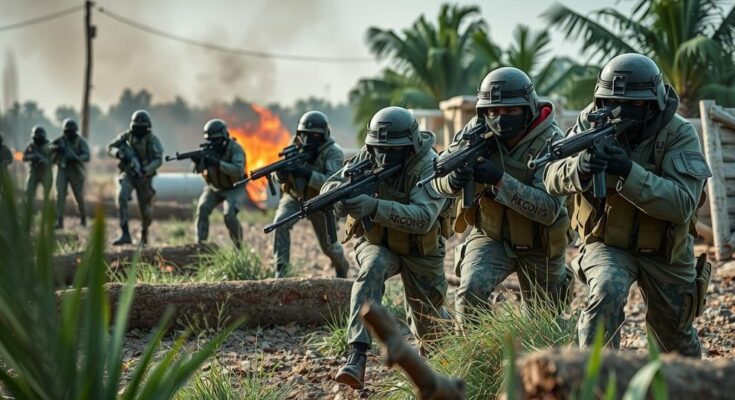The M23 conflict in eastern DRC has escalated over the past three years as the rebel group defends its actions as an ‘existential war’ for Congolese Tutsis. Led by Bertrand Bisimwa, M23 claims to protect this marginalized group amid allegations of Rwandan support for the rebels. Peace attempts have failed, and the humanitarian situation worsens as violence displaces nearly two million people.
The M23 rebel group in the eastern Democratic Republic of Congo (DRC) continues to intensify its conflict with the Congolese army, proclaiming their actions as an “existential war” aimed at safeguarding Congolese Tutsis, a community they assert has historically faced discrimination. This struggle has escalated significantly over the last three years, resulting in substantial casualties and displacing nearly two million individuals.
Initially formed in 2012 following a mutiny within the Congolese army, M23 faced setbacks before renewing hostilities in 2022 and capturing extensive territories in North Kivu. Bertrand Bisimwa, the head of M23’s political wing, contended that their military initiatives are defensive, aimed at protecting their community. “We are waging a defensive war to protect these citizens… They are not second-class citizens. The state must take care of them,” he stated in an interview with Al Jazeera.
While the Congolese government considers M23 as a paramount security threat, there are mounting allegations from international organizations, including the United Nations, that Rwanda is providing military support to the rebels, allegations that Rwanda vehemently denies. Previous peace attempts, such as the Nairobi process and mediation led by Angola, have yielded inadequate results.
Recently, M23 advanced into Lubero, North Kivu, further exacerbating the conflict. In defense of these aggressive maneuvers, Bisimwa argued that they are a necessary response to government offensives. “We cannot be blamed for defending ourselves… The logic of war dictates that when you have supremacy, you take the space from which they were shooting at you,” he asserted.
The UN condemned M23 for expanding its territorial control, yet Bisimwa disputed these claims, emphasizing their commitment to territorial defense and reducing violence. He also highlighted positive outcomes, such as the alleged return of over 480,000 displaced individuals to M23-controlled areas.
Dialogue remains a contentious subject, as the DRC government has outright rejected negotiations with M23, labeling the group a proxy for Rwanda. Bisimwa criticized this refusal, asserting, “War cannot solve our problems. Dialogue alone can address the root causes of the conflict.”
Despite facing allegations of alliances with other armed groups and exploiting local resources, Bisimwa insisted that M23 prioritizes governance and community protection, citing their role in securing Virunga National Park against illegal activities. He reiterated the group’s desire for peace, stating that if the DRC government fails to address their grievances, they should be permitted to resolve their issues independently.
The ongoing conflict involving the M23 rebel group in eastern DRC stems from complex historical and ethnic dynamics, particularly relating to the Congolese Tutsi community. This group perceives itself as protectors against systemic discrimination linked to their ties with Rwanda. The resurgence of M23’s violence beginning in 2022 has heightened tensions within the region and complicated peace efforts, drawing accusations of foreign involvement, notably from Rwanda, while also provoking a humanitarian crisis characterized by significant forced displacements. Various attempts by regional and international actors to mediate a peaceful resolution have, thus far, proven ineffective, as both sides remain entrenched in their respective positions, hindering dialogue and reconciliation efforts.
In conclusion, the conflict in eastern DRC involving the M23 rebel group, portrayed by its leaders as a necessary fight for the rights of Congolese Tutsis, underscores a complex interplay of ethnic tensions, governance failures, and external accusations of foreign support. Despite efforts from international entities to foster dialogue and peace, both the DRC government and M23 maintain starkly opposing views, complicating the potential for resolution. As the humanitarian crisis deepens due to ongoing violence and displacement, the region finds itself at a critical juncture, demanding urgent attention from the global community.
Original Source: eastleighvoice.co.ke




